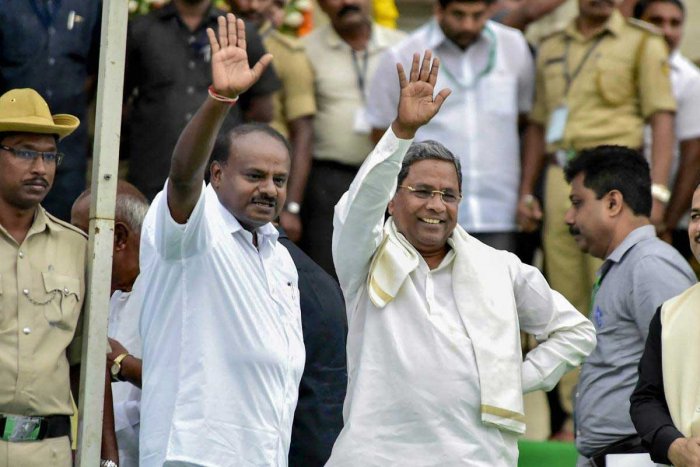
Karnataka rout may not be entirely coalition’s fault

It is tempting to blame the squabbles within Karnataka’s Congress-Janata Dal (Secular) coalition for its rout in the just-concluded general elections. Yes, the discordant notes between the leaders of the two alliance partners did make a difference. But that should have been restricted to two or, at most, three constituencies — Mandya, Mysore and Tumkur. Instead, the Congress even lost their traditional strongholds of Chikkaballapur and Kolar.
The BJP’s narrative which packaged Prime Minister Narendra Modi as the sole reason for the party’s victory seems to have worked even beyond the party’s estimation. Even if the coalition had worked well, the results may not have been very different.
State unit chief B S Yeddyurappa had said the BJP would win 22 of the 28 Lok Sabha seats in Karnataka. But, the party eventually won 26 (one of whom was an independent supported by it) with one each for the Congress and the JD(S). BJP state leaders like Yeddyurappa prior to the elections had insisted that local candidates did not matter and that everyone would vote for Modi. It sounded rhetorical, but turned out he was right.
In retrospect, was the move by the Congress and the JD(S) to form an alliance a mistake? Last year, even as the counting was on during the May Assembly elections, when it became clear that the BJP would fall short of the magic figure of 113, the Congress with 80 seats moved fast and offered to ally with the JD(S) with 37 seats and conceded the chief minister’s position to H D Kumaraswamy.
The hastily cobbled up coalition, while serving to achieve its purpose of forming the government, proved to be poorly stitched. In the last one year, the squabbles between the supporters of former chief minister Siddaramaiah and JD(S) leaders have almost brought the arrangement to a brink on a few occasions.
The question now is whether the coalition will fold up following the shocking electoral performance. While all factors point to an end game, there is a sliver of chance that it can still muster whatever spirits are left and continue with the existing arrangement, and remain in power.
If the two parties were to be pragmatic, they will not let go. For one thing that these elections have shown is that parliamentary voting could be different from that in Assembly elections.
The steamrolling of the Opposition with the single point programme called “Modi” runs contrary to the defeats of the BJP in the three northern states of Madhya Pradesh, Rajasthan and Chhatisgarh last year. And, the earlier defeats including in Karnataka, Delhi and Bihar. This means that the Congress-JD(S) alliance could still work when elections to the state Assembly are held next. In other words, letting the coalition disintegrate now would be like adding salt to an injury.
Alternatively, continuing with the coalition could work against the two partners, especially when the next Assembly elections are held. The alliance could end up damaging the core base and support of the two parties, which have long been rivals, and the anti-incumbency factor could end up placing the BJP at an advantage.
Not just that, in state politics it may be worthwhile for the electorate to have a choice among three strong and independent parties rather than two as that will keep all of them on their toes as elections can go any way. If the JD(S)- Congress alliance continues, there is a possibility that the two could eventually fuse into a single entity making Karnataka a two-party state which would mean the dilution of choice for the voter.
Notwithstanding these scenarios, the ground reality at the moment is that the leadership of the two parties will be busy attending to their wounded egos and political setback.
There could be an attempt by each of the two parties to make their partners the scapegoat for the losses – especially in Mandya where the JD(S) had accused the local Congress leadership of working for the BJP-supported independent candidate Sumalatha, who eventually won. The other big shock was the defeat of former prime minister and JD(S) supreme H D Deve Gowda in Tumkur. There was a revolt by the local Congress leadership in his constituency too and the JD(S) may not forgive its ally for possibly not backing Gowda to the hilt here.
A few days back, in a revolt from unexpected quarters, former Congress minister Roshan Baig ridiculed his colleagues in the state and the party’s central observer K C Venugopal, who he termed a “buffoon”. This could indicate that Baig is in touch with the BJP and defect to it along with a few more legislators as he has been reportedly unhappy at not being given a berth in the coalition ministry and was passed over as a candidate from the Bangalore Central constituency. So, the end to the alliance may come from this quarter.
However, it is certain that the coalition is critically poised and a movement one way or the other will have long-term consequences for Karnataka’s politics.


